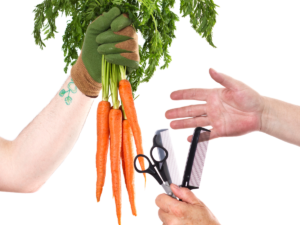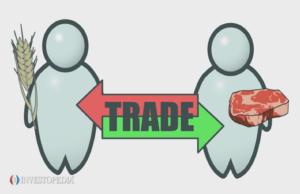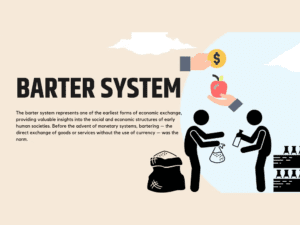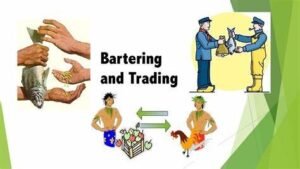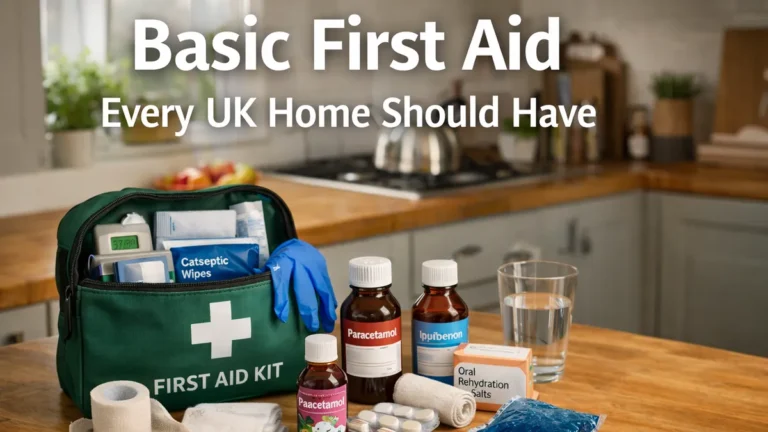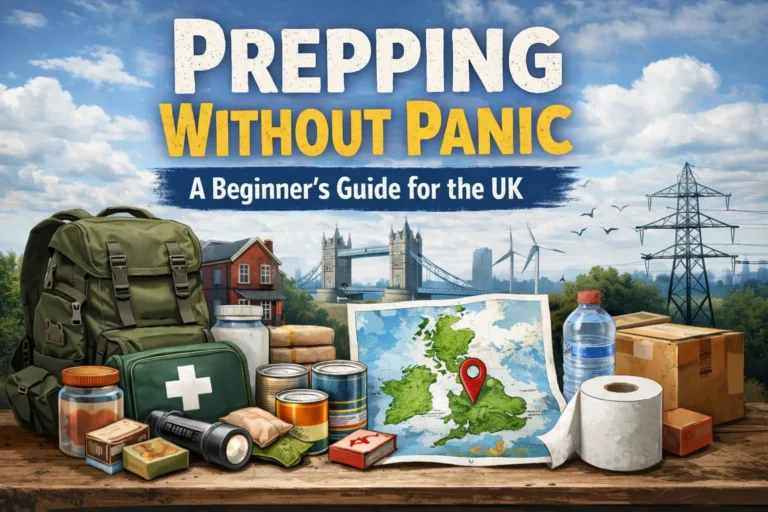Imagine waking up one morning to find the economy has collapsed. Cash is worthless, and the usual channels of obtaining goods and services have broken down. For many UK preppers, this nightmare scenario is a constant concern. That’s where bartering and trading become invaluable. In this guide to bartering, I’ll share essential strategies to help you navigate a world without money.
Understanding how to barter effectively not only prepares you for economic instability but also empowers you to secure the resources you need to thrive. From trading food and tools to skills and knowledge, having a bartering strategy in place ensures you can sustain yourself and your community when traditional systems fail.
Post Contents
ToggleWhy Bartering is Essential in a Collapsed Economy
When the economy crumbles and cash loses its value, many are left wondering how to obtain necessary goods and services. Bartering and trading emerge as pivotal methods to secure what we need to survive. Let’s explore why bartering becomes indispensable during such challenging times.
Understanding Economic Collapse
An economic collapse happens when a country’s financial system fails. This means banks might shut down, leading to a swift decline in the value of currency. People lose trust in money as it no longer holds any real value. This situation can create widespread panic, scarcity of goods, and can significantly affect everyday life.
In the face of such a collapse, traditional job markets shut down and stores may run out of supplies. People often face challenges in:
- Accessing Food and Water: Grocery stores could run empty quickly.
- Obtaining Medicine: Pharmacies might close, halting access to essential medications.
- Securing Shelter: Financial difficulties can make housing an issue.
In such scenarios, the survival of everyday people gets heavily impacted. People are forced to look for alternatives to meet their daily needs.
The Role of Bartering in Survival
Bartering becomes a lifeline. When money no longer works, trading goods and services directly becomes the new norm. Here’s why bartering becomes essential:
Essential Goods Exchange: Inable to purchase things, bartering allows you to trade items like food, clothes, and tools that have immediate value. For instance, trading stored food for firewood can ensure warmth during winter.
Skill Exchange: Sometimes, skills can speak louder than currency. Medical knowledge, mechanical skills, or even skills in farming can be bartered. If someone knows how to fix a car, they can trade this service for food or other essentials.
Community Building: Bartering fosters a sense of community. It encourages people to interact and support each other. Instead of thinking in terms of profits, people begin to trade fairly, ensuring that everyone in the community benefits.
Trade Network: Bartering isn’t just about survival; it’s about developing a network of reliable trades. It’s about establishing a trusted group of traders, creating resilience against the unpredictability of a collapsed economy.
Historically speaking, bartering has always been a fallback during economic downturns. During various crises, such as the Great Depression, people exchanged goods and services to meet their daily needs when money wasn’t available. The relevance for modern preppers is clear – understanding bartering can dramatically increase chances of survival when traditional economy mechanisms no longer function.
For more on why bartering is significant in a collapsed economy, you can refer to Reliable Bartering Systems Amid An Economic Collapse and Barter: The Overlooked Hero of the Economy.
By understanding these principles, we can turn the uncertainty of economic collapse into sustainable and practical solutions. Stay prepared, stay informed, and always have a bartering plan ready.
Guide To Bartering Essential Items to Stockpile
As preppers, we know that in a collapsed economy, bartering becomes a vital skill. Knowing what items will have high value during such times can make all the difference in ensuring you and your loved ones have the essentials to get through tough days. Let’s explore the most critical items to stockpile for successful bartering.
If you would like to see a guide on uk prepping on a budget click HERE
Consumables and Perishables
When everything collapses, some items become more critical than ever. Consumables and perishables are universally needed, making them highly valuable in a barter economy.
Food and Water
In a world where stores are empty, food and water become absolute necessities. Stockpiling the following can make you a crucial player in the bartering market:
- Non-Perishable Foods: Canned goods, dried beans, rice, and pasta can last a long time.
- Water Purification: Filters and tablets to purify water are essential.
Medical Supplies
Healthcare can take a massive hit during economic turmoil. Stocking up on medical supplies not only prepares you for emergencies but also makes you a sought-after trade partner.
- First Aid Kits: Basic kits including bandages, alcohol wipes, and gauze pads.
- Medicines: Over-the-counter medications like pain relievers, cold medicine, and antibiotic ointments.
For a detailed list on essential items, you can check out this comprehensive guide.
Tools and Equipment
Tools and equipment will be in high demand when people need to be more self-reliant. These durable goods can provide immense value in a barter economy.
Hand Tools
Simple, non-electric tools can empower individuals to repair, build, and maintain their homes or other essential structures.
- Hammers, Screwdrivers, and Wrenches: These basic tools are vital for any repair tasks.
- Saw and Axes: Necessary for cutting wood for fuel or construction.
Farming Equipment
For those looking to produce their own food, farming equipment is invaluable.
- Gardening Tools: Items like shovels, rakes, and hoes are important.
- Seeds: Packs of seeds for various vegetables can be incredibly valuable.
Stocking a variety of tools can make you the go-to person for trade in times of need.
Luxury and Comfort Items
In difficult times, anything that can provide a bit of comfort becomes immensely valuable. These items might not be necessary for survival but are highly prized in a barter economy.
Alcohol and Tobacco
Items such as alcohol and tobacco become prime barter goods.
- Alcohol: Beyond consumption, alcohol can be used as a disinfectant or even fuel.
- Tobacco: Many value tobacco highly for its calming effects.
Hygiene Products
Remaining clean is closely tied to health, which increases the value of hygiene products.
- Toilet Paper and Soap: These fundamental items can be worth their weight in gold.
- Feminine Hygiene Products: These are crucial and often overlooked.
Gathering a stock of these items can turn you into an essential contact in your community.
Practicing how to barter wisely and having an inventory of these essential items ensures you are ready for any economic adversity. Remember, in a world where our traditional systems fail, having the right items to barter can be the key to enduring and even thriving through the crisis.
For more insights into valuable bartering items, explore this discussion among experienced preppers.
Skills as Barter Currency
In a collapsed economy, physical goods aren’t the only items of value. Skills become a unique currency on their own, and those who possess valuable skills can trade their expertise for essential goods and services. Let’s dive into some of the key skills that can be bartered when times get tough.
Medical and First Aid Skills
Medical and first aid skills are incredibly valuable in any barter economy, especially during a crisis when the healthcare system is overwhelmed or non-existent. People will always need medical attention for various reasons, from minor injuries to more serious health issues.
Doctors, nurses, and even those with basic first aid knowledge can provide lifesaving assistance. These skills might include:
- Administering CPR: Knowing how to revive someone from a cardiac arrest can make you an essential member of any community.
- Wound Care: Skill in cleaning and dressing wounds prevents infections and promotes faster healing.
- Basic Medical Treatments: Being able to treat common illnesses or injuries like burns, fractures, or infections can be crucial.
If you possess these skills, you can trade your medical services for goods like food, water, or other essentials. Your expertise can also help foster strong community ties, where people look out for one another’s well-being. You might even consider teaching basic first aid to others in exchange for goods, expanding your network of people who owe you favours.
Agricultural and Food Production Skills
In a world where traditional supply chains break down, the ability to produce food locally becomes extremely valuable. Agricultural and food production skills can turn barren land into a thriving source of sustenance, making you an essential player in a barter economy.
Skills that stand out include:
- Gardening: Knowing what to plant and when, as well as how to care for a garden, is invaluable. Fresh vegetables and fruits are always in demand.
- Animal Husbandry: Skills in raising livestock like chickens, goats, or cattle can provide meat, milk, eggs, and other nutritious foods.
- Food Preservation: Canning, dehydrating, and other food preservation methods ensure you have a steady supply of food through different seasons.
Those with agricultural skills can trade their produce and knowledge for other necessities. For example, you could barter fresh produce for tools, medical supplies, or even services like handyman work. Additionally, teaching others how to grow their own food can create a system of mutual aid, where your community thrives together.
By leveraging your knowledge in these areas, you position yourself not only as a valuable member of your community but also as someone who can ensure the survival and well-being of those around you. Remember, in a collapsed economy, skills often become more valuable than gold.
For more in-depth insights, The Provident Prepper’s Guide to Bartering offers an extensive look at top bartering skills. This can help you understand which skills to hone and how they can be effectively traded in times of need.
Best Practices for Successful Bartering
Navigating a broken economy through bartering involves more than just swapping goods—it’s about creating relationships, negotiation skills, and understanding value. Let’s look at the best practices to make your bartering efforts successful.
Building Trust and Reputation
A trustworthy reputation is your most valuable asset in a barter economy. Without money to rely on, your word and behavior become your currency. Here’s why building trust and reputation is essential:
Reliability: Always honor your agreements. If you promise to deliver a service or item, do so promptly. This builds reliability and ensures future trades.
Transparency: Be clear about the quality and condition of what you’re offering. Misleading others can tarnish your reputation and harm future trades.
Fairness: Ensure the trades are fair and beneficial for both parties. No one likes feeling shortchanged. By ensuring fairness, you build lasting relationships.
In your bartering journey, think of your reputation as your resume. Just like a job, people will refer to past experiences with you. You can read more about maintaining integrity in bartering at Guidelines for Successful Bartering.
Negotiation Techniques
Successful bartering requires strong negotiation skills to reach mutually satisfying agreements. Here are practical tips to ensure effective negotiations:
Know Your Value: Understand the intrinsic value of what you’re offering. Research and compare it to similar items or services. This way, you start with a firm idea of worth.
Listen First: Understand what the other party needs. Listening allows you to tailor your offer more effectively, making your trade more appealing.
Be Ready to Walk Away: Sometimes, it’s essential to be willing to walk away if a trade doesn’t serve your needs. Desperation can lead to unfavourable deals.
Counter-Offer Wisely: If an initial offer isn’t satisfactory, present a well-thought counter-offer. Use facts to support why the exchange should be adjusted.
Build Rapport: Create a positive relationship with your trading partner. Show genuine interest and respect towards their needs and items, making negotiations smoother.
A useful read on honing these skills is the Learn How to Barter, Haggle, and Negotiate, which offers detailed tips on improving your negotiation game.
In the end, bartering isn’t just about the exchange—it’s about the exchange of trust and ensuring both parties leave feeling valued. By leveraging these best practices, you’ll navigate a barter economy more efficiently and successfully.
Setting Up a Bartering Network
Establishing a reliable bartering network is crucial for ensuring survival and stability when the economy collapses. A well-connected bartering network ensures you always have access to essential goods and services.
Identifying Potential Trading Partners
Finding and vetting potential bartering partners within your local community is the first step to building a trustworthy network. Here are some effective ways to identify potential trading partners:
Community Events: Attend local gatherings such as farmer’s markets, community fairs, and preparedness meet-ups. These events are great for meeting like-minded individuals who could become reliable bartering partners.
Online Forums and Social Media Groups: Engage with local online communities such as prepper forums and social media groups. Websites like PrepperForums and Facebook groups dedicated to prepping are excellent starting points.
Neighbourhood Surveys: Conduct informal surveys in your neighbourhood. A simple flyer or a knock on the door can help you understand who in your community might have valuable skills or resources to trade.
Local Businesses: Small local businesses often rely on community support. Engaging with them can open opportunities for barter agreements, especially if they provide essential goods or services like food, repairs, or medical supplies.
Vet potential partners by considering their reputation, reliability, and what they have to offer. It’s essential to establish trust and ensure they are equally invested in maintaining mutual benefits within the network.
Establishing Trade Agreements
Creating clear and mutually beneficial trade agreements is critical for a successful bartering network. Here’s how you can set up effective trade agreements:
Define Terms Clearly: Be explicit about what is being traded, the quantities involved, and the timelines for exchange. Written agreements, even if informal, can help clarify expectations and prevent misunderstandings.
Determine Value: Agree on the value of goods or services being exchanged. You might use a simple point system or establish value based on barter fairs or existing community standards. Websites like The Provident Prepper’s Guide to Bartering provide useful insights on valuing barter items.
Mutual Benefits: Ensure that trade agreements are fair and beneficial for both parties. Both participants should feel they are gaining value, which strengthens the trust and reliability of your network.
Agree on Quality: Set standards for the quality and condition of goods or services. For instance, clearly state that food should be non-perishable and tools must be in working condition.
Flexibility: Maintain flexibility to renegotiate terms as needed. Economic and personal circumstances can change, and it’s essential to adapt to keep the bartering network functional.
By thoughtfully setting up your bartering network and crafting clear trade agreements, you build a resilient and reliable system that can provide critical support in times of need. Creating these connections within your community ensures everyone is better prepared to face an uncertain future together.
For further reading on setting up and managing a successful bartering network, consider referring to the Prepper’s Guide to Bartering and Trading.
Staying Safe While Bartering
Engaging in bartering can be crucial during an economic collapse, but it’s not without its risks. Safety should always be your top priority to protect yourself and your possessions. Let’s explore some practical tips for staying safe while bartering.
Securing Trade Locations
Choosing the right location to conduct trades is vital for ensuring your safety. Here are some key points to keep in mind when selecting trade locations:
Neutral and Public Spaces: Always choose a neutral location that’s public and well-trafficked. Avoid secluded areas where you can easily be outnumbered or ambushed.
Well-Known Areas: Pick places that are well-known to you and your trading partner to avoid getting lost or facing unexpected dangers.
Pre-arranged Signals: Establish pre-arranged signals or codewords with your group so you can communicate quickly and discreetly if something feels off.
Safe Parking & Exit Routes: Make sure there’s safe parking and clear exit routes. Planning your escape route ensures you can leave swiftly if the trade goes south.
Surveillance: Consider using locations with video surveillance, such as outside community centers or libraries. This can deter potential troublemakers.
Trading in secure locations is a fundamental aspect of safety. For more detailed information, you might find the ideas shared on Safe Bartering very useful.
Personal Safety Measures
Personal safety should never be compromised during barter transactions. Here are some tried-and-true tips to bolster your personal security:
Travel in Groups: Never go alone. Always travel with at least one other person, preferably someone who can help defend you if necessary.
Be Cautious of Unknown Traders: Trust your instincts. If something feels off about a trader, it’s better to walk away. Always verify the identity and reputation of new trading partners.
Limit What You Bring: Don’t bring all your goods to the trade location. Only carry what you intend to barter to minimize losses in case something goes wrong.
Keep Communication Open: Keep in constant communication with someone outside of the trade. Inform them of your location, expected return time, and who you’re dealing with.
Protection Tools: Consider carrying non-lethal protection tools such as pepper spray or a personal alarm. These can provide an added layer of defense if needed.
Document Everything: If possible, document your trade dealings. Note what was traded, with whom, and under what conditions. This can help if disputes arise and build your reputation as a fair trader.
Ensuring personal safety is critical as you navigate bartering in uncertain times. Engaging with communities, like the discussions found on Thoughts on Trading/Bartering if a True SHTF, can provide valuable perspectives and additional safety tips.
Through these measures, you can significantly mitigate the risks involved in bartering and protect yourself and your assets. Stay smart, stay prepared, and always prioritize safety.
Conclusion
The practicality of a bartering system in a collapsed economy cannot be overstated. By understanding the essentials of bartering, prepping valuable goods, honing vital skills, and establishing reliable networks, we create a safety net for ourselves and our communities.
Preparedness is key. Stockpile useful items, learn essential skills, and start building your barter network now. This proactive approach not only ensures your survival but also supports the resilience of those around you. Let’s stay prepared and ready for whatever the future holds.
Check out our Survival Essentials kit Below




